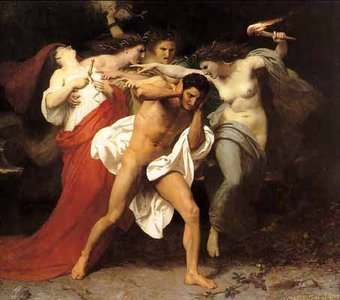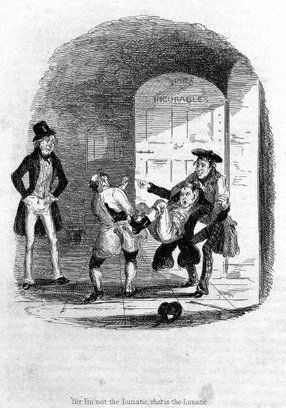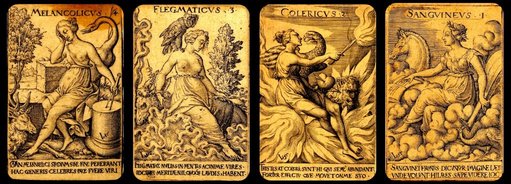OLD ENGLISH
Madness is the oldest and broadest term to mean what we understand as mental illness today. Initial meanings of madness include ‘crippled,’ ‘injured,’ and ‘foolish.’ It pointed to a loss of reason due to pathology. Those who were mad were irrational and lacked control. However, it was the loss of intellect rather than the loss of reasoned behavior that was most important
17.

37 A painting of the three women, collectively known as the Erinyes in Greek mythology, surrounding a man who is covering his ears and is trying to escape.Erinyes point to a woman with a knife in her chest, the victim of the unavenged crime that the man committed, while looking at the man with very aggressive and frightening expressions. MIDDLE ENGLISH PERIOD (1100 – 1500)
Crazy originates from Scandinavia and meant ‘cracked.’ It later evolved to mean ‘broken’ and was used to describe unreliable containers and vessels in the 16th century. When it later became adapted to describe the body, it was a description of the physical state rather than the mental state. In other words, it was a word used to describe an aging body. It was not until the late 17th century – early 18th century that the word became used to describe a person’s mental state. Over time, the word became applied to states of confusion and enthusiasm as we understand it today
18.
Fury was adapted into English from Old French (800 – 1550) but was originally from Greek mythology. The myth was about three female creatures called the Erinyes,which pursued those who had commited unavenged crimes until they became mad. These creatures were adapted by the Romans, who renamed them as Furiae from the word furere which means ‘to rage or storm.’ Although today the word means intense anger, to be furious was to be insane from the 15th century to the 1800
17.
EARLY 15TH CENTURY
Delusion originates from Latin and originally meant deception or befooling. In the early 16th century, it began to be applied to mental confusions due to false beliefs
18.
EARLY 16TH CENTURY
Insane originally referred to an unhealthy body or mind but was mostly used to refer to the mind. It was seen as a synonym of madness. Doctors stopped using insane as a clinical term in the early 20th century but it is still used in law today to mean irrational more broadly
17.
Lunatic was commonly used from the 16th to the 18th centuries in England. It was derived from the Roman moon goddess luna. The moon was believed to lead to mental instability in ancient Rome. Although it is similar to madness, it originally meant cyclical insanity rather than chronic insanity. By the early 19th century, it became a synonym of insanity
17.

38 The picture shows a man being forcefully removed by two other men while pointing a finger at a fourth man saying "I'm not the lunatic, that is the lunatic." originates from Latin and was used to refer to a siege in the early 16th century. It soon developed to mean troubled by an evil spirit, which later came to mean a destructive “fixed idea”
19.
LATE 16TH CENTURY
Delirium comes from Latin where it meant ‘to go out of the furrow’ and was synonymous with madness. It was not long before it encompassed temporary or transient lack of reason as we understand it today
18.
17TH CENTURY
Melancholy originates from the humors theory and meant ‘black bile,’ which in excess was thought to cause depression, and violent anger. It was only related to clinical depression in the 17th century. Previously, it had been understood to mean not only sadness but also general insanity
19.
18TH CENTURY
Hallucinate has Latin and Greek roots meaning to ‘wander in mind’ and therefore referred to a state of mental confusion. Until the late 18th century, it was synonymous with “confused.” During the late 18th century however, it came to mean ‘false impression,’ which evolved into ‘false perception’
17.
EARLY 19TH CENTURY
Berserk was borrowed from Old Norse. The word originally meant ‘bear shirt,’ something that the Old Norse warrior wore. In English, it originally meant a ‘frenzied attack,’ which implied killing until no enemies remained. It was an act without reason or logic
18.
Paranoia originates from Greek and literally means ‘a little off reality.’ In the early 19th century, it came to mean general mental irrationality and was synonymous with dementia and delirium. It later also became associated with fear
19.
Psychosis originates from Greek and meant the ‘principle of life or animation.’ However, it came to mean ‘condition or disease of the mind or soul’
19.

39 A print showing the state of melancholy, which was believed to be caused by an excess of black bile. A woman sits with her right arm supporting her head and gazes down towards the floor.


